- Home
- Tom Sharpe
Ancestral Vices
Ancestral Vices Read online
Contents
About the Author
Also by Tom Sharpe
Title Page
Chapter 1
Chapter 2
Chapter 3
Chapter 4
Chapter 5
Chapter 6
Chapter 7
Chapter 8
Chapter 9
Chapter 10
Chapter 11
Chapter 12
Chapter 13
Chapter 14
Chapter 15
Chapter 16
Chapter 17
Chapter 18
Chapter 19
Chapter 20
Chapter 21
Chapter 22
Chapter 23
Chapter 24
Chapter 25
Chapter 26
Chapter 27
Chapter 28
Copyright
About the Author
Tom Sharpe was born in 1928 and educated at Lancing College and Pembroke College, Cambridge. He did his national service in the Marines before going to South Africa in 1951, where he did social work before teaching in Natal. He had a photographic studio in Pietermaritzburg from 1957 until 1961, and from 1963 to 1972 he was a lecturer in History at the Cambridge College of Arts and Technology.
He is the author of sixteen novels, including Porterhouse Blue and Blott on the Landscape which were serialised on television, and Wilt which was made into a film. In 1986 he was awarded the XXIIIème Grand Prix de l’Humour Noir Xavier Forneret and in 2010 he received the inaugural BBK La Risa de Bilbao Prize. Tom Sharpe died in 2013.
Also by Tom Sharpe
Riotous Assembly
Indecent Exposure
Porterhouse Blue
Blott on the Landscape
Wilt
The Great Pursuit
The Throwback
The Wilt Alternative
Vintage Stuff
Wilt on High
Grantchester Grind
The Midden
Wilt in Nowhere
The Gropes
The Wilt Inheritance
Ancestral Vices
Tom Sharpe
1
Lord Petrefact pressed the bell on the arm of his wheelchair and smiled. It was not a nice smile, but few of those who knew the President of Petrefact Consolidated Enterprises at all well, and they were an unlucky few indeed, would have expected him to smile nicely. Even Her Majesty, persuaded against her better judgement by the least scrupulous Prime Minister to grant Ronald Osprey Petrefact a peerage, had found his smile almost threatening. Lesser dignitaries were accorded smiles that ranged from the serpentine to the frankly sadistic depending upon their standing with him, a function purely of their temporary utility, or, in the case of his more memorable smiles, of his not needing them at all.
In short, Lord Petrefact’s smile was simply the needle of his mental barometer whose scale never registered anything more optimistic than favourable and was more frequently set at stormy. And since his illness, occasioned by the combined efforts of one of his financial editors (who had unwittingly slated shares in which Lord Petrefact had recently invested) and a particularly resentful oyster, his smile had assumed such a lopsided bias that it was possible to sit on one side of him and suppose that, far from smiling, he was merely baring his dentures.
But on this particular morning his smile almost approached the genial. He had, to employ his favourite metaphor, thought of a way of killing two birds with one stone, and since one of those birds consisted of the members of his own family, it was a singularly pleasing thought. Like so many great men Lord Petrefact loathed his nearest and dearest, their nearness and in the case of his son, Frederick, certainly his dearest in financial terms, being directly proportional to his loathing. But it wasn’t simply his immediate family who would be put out by what he had in mind. The numerous and infernally influential Petrefacts scattered about the world would be highly indignant, and since they had always disapproved of him he found a great deal of pleasure in anticipating their reactions.
In fact it had taken all his financial guile and the collaboration of an American company which he had surreptitiously taken over to put an end to their meddling in what had until then been the family business. Even his peerage had been a source of considerable acrimony and it had only been his argument that unless he was allowed to elevate his own name he would almost certainly desecrate that of the entire Petrefact tribe by going to gaol that had persuaded them. But then they prided themselves on being one of the oldest families in the Anglo-Saxon world and counted among their ancestors several who predated the Conquest. Not that they had made themselves socially conspicuous. They had, as it were, kept themselves to themselves to the point where Uncle Pirkin, who compiled the genealogical record in Boston, Mass., had several times to invent spurious wives to obscure the taint of incest.
Certainly for some rather sinister reason the Petrefacts had produced a statistically abnormal number of supposedly male offspring. For once Lord Petrefact had to agree with old Pirkin. The evidence of abnormality, both statistical and sexual, had been brought home to him by his sons. His wife, the late Mrs Petrefact, had boasted rather prematurely that she never did things by halves and had promptly contradicted her assertion by producing twins. Their father had greeted their birth with some dismay. He had married her for her money, not for her ability to turn out twins at the drop of a hat.
‘I suppose it could have been worse,’ he had grudgingly admitted on hearing the news. ‘She could have spawned quadruplets, and daughters at that.’
But by the time the twins, Alexander and Frederick, had reached puberty even their doting mother was beginning to have doubts.
‘They’ll probably grow out of it,’ she told her husband when he complained that he had found them role-swapping in his en suite toilet. ‘They’ve simply got an identity problem.’
‘What I saw didn’t suggest simplicity,’ snapped Petrefact, ‘and when it comes to identity I’ll know one from the other when one of the little sods stops wearing earrings.’
‘I don’t want to hear.’
‘And I didn’t want to see. So for Chrissake lock your goddam suspender belts away someplace.’
‘But, Ronald, I gave up wearing them years ago.’
‘Well I just wish everyone else around here would too,’ said Lord Petrefact, slamming the door to emphasize his disgust. But the uncertain gender of his sons continued to haunt him and it was only when Frederick had proved his manhood, at least in part, by being seduced by one of his mother’s best friends that Lord Petrefact was reconciled to the thought that he had one male heir. With Alexander there was no knowing. Or not until one evening several years later when Frederick, who should have been at Oxford, sauntered into a reception being held to honour the Minister for Land Development in Paraguay who was on the point of negotiating the sale of ninety per cent of his country’s mineral rights to the Petrefact subsidiary, Groundhog Parities.
‘I am afraid I have to announce that we have just lost a member of the family,’ he told the assembled company, looking with pointed gloom at his mother.
‘Not . . . you can’t mean . . .’ began Mrs Petrefact.
Frederick nodded. ‘I am afraid my brother has taken the plunge. I tried to dissuade him but . . .’
‘You mean he’s drowned himself?’ Petrefact asked hopefully.
‘Oh my poor Alexander,’ moaned his wife.
Frederick waited until her sobs were clearly audible. ‘Not yet, though doubtless when she comes round . . .’
‘But I thought you said he was dead.’
‘Not dead but gone before,’ said the appalling Frederick. ‘What I actually said was that we had lost a member of the family. I can think of less
delicate ways of putting it but none so exact. I didn’t, for instance, say—’
‘Then don’t,’ shouted Petrefact, who had finally caught the meaning of the altered pronoun. His wife had been more obtuse.
‘Then why did you say he had taken the plunge?’
Frederick helped himself to a glass of champagne. ‘I’ve always assumed there must be some degree of plunging in that sort of operation. And Alexandra, or Alexander as she then was, certainly took it . . .’
‘Shut up!’ yelled Petrefact, but Frederick was not to be silenced so easily.
‘I always wanted a sister,’ he murmured, ‘and while I may be a little premature you can at least console yourself, Mother dear, that you haven’t lost a son but gained a neuter.’
Nor was that all. As the unconscious Mrs Petrefact was carried from the room Frederick had enquired of the Minister if the Catholic Church held as strong views on sex change as it did on abortion.
‘But of course not. One has only to think of church choirs of castrati,’ said Frederick gaily before turning to the Minister’s wife to hope with assumed sympathy that she hadn’t found the operation too painful in her own case.
As the reception broke up Petrefact had formed one strong and unalterable resolution: neither his son nor his presumed daughter would ever inherit their father’s estate. Nor was he reconciled by the premature death of Mrs Petrefact some six months later. Frederick had been cut off, appropriately in Lord Petrefact’s view, without a penny while Alexandra, already sufficiently excised, was paid a pitiful allowance on which she ran a hairdressing salon in Croydon.
Relieved of their presence and his matrimonial duties Lord Petrefact had continued his rise to fame and enormous fortune with a ruthless drive that was fuelled by his knowledge that his will, drawn up by a team of expert lawyers, was uncontestable. He had left his entire estate to Kloone University and had already installed the most advanced computer there as evidence of his goodwill and proof of his good sense. Petrefact Consolidated had been spared the expense of maintaining the computer themselves and the tax avoidance advantages of channelling profits through a charitable institution had proved considerable.
And now as he sat in his office overlooking the Thames Lord Petrefact’s thoughts, ever a mixture of family loathing and financial calculation, turned once more to Kloone. The University might hold his computer: it also held someone less amenable to programming in the person of Walden Yapp. And Yapp had arbitrated in too many industrial disputes to be taken lightly. He was just considering how nicely he had planned things when Croxley entered.
‘You rang?’
Lord Petrefact looked at his private secretary with his usual distaste. The man’s refusal to address him as ‘My Lord’ was a daily irritation but Croxley had been with him for almost half a century and at least his loyalty wasn’t in doubt. Nor, for that matter, his memory. Before the coming of the computer Croxley had been the nearest thing to a human information storage system Lord Petrefact had ever found.
‘Of course I rang. I intend to go to Fawcett.’
‘Fawcett? But there’s no one there to look after you. The indoor staff were dispensed with eight years ago.’
‘Then make provision for a firm of private caterers to deal with matters.’
‘And will you be wanting the resuscitation team?’
Lord Petrefact goggled at him. Sometimes he wondered if Croxley had the brains of a louse. Presumably he must have to possess his incredible memory, but there were moments when Lord Petrefact had his doubts.
‘Of course I want the resuscitation team,’ he shouted. ‘What the hell do you think I have this red button for?’
Croxley regarded the red button on the wheelchair as if seeing it for the first time.
‘And I want a computer forecast on production increases at the Hull plant.’
‘There aren’t any.’
‘Aren’t any? There’ve got to be. I don’t employ that damned computer to sit on its arse and not turn out forecasts. That’s what the bloody thing’s—’
‘Aren’t any increases. In fact to the best of my latest knowledge since the new machinery was introduced production has fallen by almost seventeen point three recurring per cent. In the months March through April plant utilization was limited—’
‘All right, all right,’ snapped Lord Petrefact, ‘there’s no need to go on.’
And having dismissed his private secretary with the similarly private thought that the confounded man was a recurring point himself and why the hell he’d ever bothered to install the computer when he had Croxley he’d never know, Lord Petrefact settled back in his wheelchair and considered the next moves in his own interminable battle with his workforce. Closure of the Hull factory would be a well-chosen symbolic gesture. But first there was Yapp to be manipulated. And Fawcett House was near to Kloone.
2
The University Library at Kloone is not a building of outstanding beauty. It stands on a grassy mound overlooking the refinery, the propane tanks and the chemical installations from which its students had been intended to draw their inspiration and, even less successfully, the University had hoped to gain a large proportion of its income. In the event neither hope had been fulfilled. The University attracted the highest number of low-grade Arts students while earning a reputation second only to Oxford for producing the most incompetent scientists in the country.
In large part the building of the Library had been responsible for this strange reversal of expectation. Originally designed in the late fifties as a relatively demure structure, it had been given its new dimensions following the accidental visit of Sir Harold Wilson, then mere Harold, in the heady days at the start of his first administration. Thanks to a fog and the political bias of the Chief Constable, the Prime Minister had arrived at Kloone instead of Macclesfield and had been so overwhelmed by the changes evidently achieved at the local Working Men’s Club in so short a time since his last visit while campaigning that he had made an impassioned plea for ‘the creation of a library to commemorate and indeed sustain the technological advances the vast mass of people are about to see, and if this example of radical improvement is anything to go by, have already seen under Labour’. To further this great work the Prime Minister had taken out his cheque book there and then and had made the first subscription of one hundred pounds while noting on the stub that the sum was to be deducted from his income tax as a necessary expense. From this act of fortuitous generosity there had been no turning back. To protect the Prime Minister’s reputation, prominent businessmen with left-wing insurance policies, trade unions, party officials, multinational companies with an eye to North Sea oil, Members of Parliament and eminent prison visitors had all poured contributions into the Kloone University Library Fund while the university council had promptly scrapped the original plans and had offered a prize to the architect whose design best expressed the technological advances the Prime Minister had so eloquently prophesied. The Library fulfilled these conditions to the letter.
Built of reinforced and unnecessarily prestressed concrete, a maze of metal conduits and carbon fibre columns all of which supported nothing more substantial than an acre of glass, the Library managed to break every rule in the energy conservationist’s handbook. In summer it sweltered in post-tropical heat to the point where the lifts could only be prevented from seizing up between floors by the installation of an intricate and enormously expensive air-conditioning system. During the winter months it switched to Arctic and the temperature dropped so abruptly that it was frequently necessary to use microwave ovens before books, which had suffered excessive humidity during the summer, could be defrosted and opened at all. To remedy these sub-zero effects it had been essential to duplicate the air-conditioning system with central heating using the same metal conduits for which some purpose had finally been found. Even then, thanks to the architect’s obsession with the idea of advanced technology and his consummate ignorance of its practical application, a slight spell of brigh
t weather followed by a small cloud could threaten students who had been sunbathing one moment with frostbite the next.
In fact during early spring and autumn it was essential to run both cooling and heating systems at the same time or to alternate between them extremely abruptly to maintain even a moderately comfortable atmosphere. It had been during one of these sudden switches that a large section of glass, less ready to make allowances for the stresses to which it was being subjected than the human occupants, had disintegrated both itself and the deputy librarian who had been on the point of masturbating in the open-plan lavatories two hundred and thirty feet below. From that dreadful day the toilets had been known as Death Row and avoided by the more nervous readers, much to the disgust of the surviving librarians and with a disregard for hygiene not normally associated with places of higher learning.
Faced with ultimatums from the library staff and in a frantic attempt to restore ordure to more sanitary disposal points than Early English and Middle Slavonic, the authorities had erected a screen of chicken wire immediately below the vast glass roof in the hope that this would engender fresh confidence in the toilets. As an incentive it was only partially successful. While it saved a number of valuable books from being used for improper purposes it had the disadvantage of making even limited ventilation impossible and the cleaning of the inside glass a matter of infinite patience and dubious value. Before long the great glass structure had assumed a mottled and perfervid green which had at least the merit of giving the Library a faintly botanical air from the outside. Inside, the ‘faintly’ could be omitted. In the unique climate strange bacteria, lichen and the lowest forms of vegetable life proliferated. A green light filtered down on the shelves and with it a fine mist of algae which, having condensed under the roof, now made homes for themselves in the carpet of the Reading Room or more irrevocably between the covers of books. Several stacks on the fourteenth floor actually exploded and in the Manuscript Room a number of irreplaceable papyri on loan from the University of Port Said were so finely composted, or formed such intractable symbiosis with their hosts, that they defied decipherment or even partial restoration.

 Blott on the Landscape
Blott on the Landscape Porterhouse Blue
Porterhouse Blue The Wilt Alternative:
The Wilt Alternative: The Great Pursuit
The Great Pursuit Ancestral Vices
Ancestral Vices The Midden
The Midden Vintage Stuff
Vintage Stuff The Throwback
The Throwback Grantchester Grind:
Grantchester Grind: Wilt on High:
Wilt on High: Riotous Assembly
Riotous Assembly Indecent Exposure
Indecent Exposure The Gropes
The Gropes Wilt in Nowhere:
Wilt in Nowhere: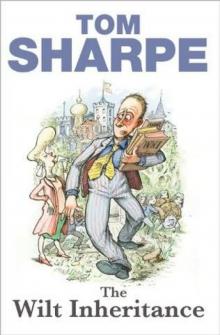 The Wilt Inheritance
The Wilt Inheritance Wilt:
Wilt: The Wilt Alternative
The Wilt Alternative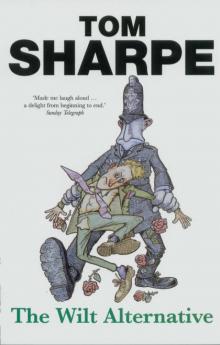 The Wilt Alternative w-2
The Wilt Alternative w-2 Grantchester Grind
Grantchester Grind Wilt on High
Wilt on High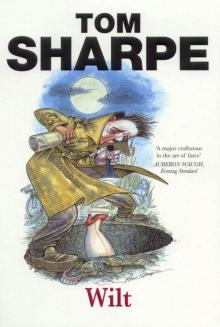 Wilt w-1
Wilt w-1 Wilt
Wilt The Wilt Inheritance (2010)
The Wilt Inheritance (2010) Wilt in Nowhere
Wilt in Nowhere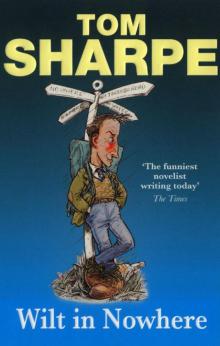 Wilt in Nowhere w-5
Wilt in Nowhere w-5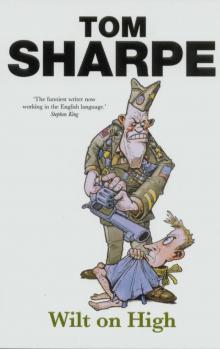 Wilt on High w-3
Wilt on High w-3